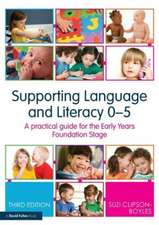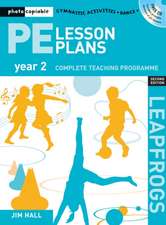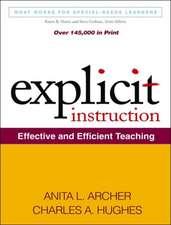The Educated Subject and the German Concept of Bildung: A Comparative Cultural History: Routledge Cultural Studies in Knowledge, Curriculum, and Education
Autor Rebekka Horlacheren Limba Engleză Paperback – 18 mai 2017
| Toate formatele și edițiile | Preț | Express |
|---|---|---|
| Paperback (1) | 393.80 lei 43-57 zile | |
| Taylor & Francis – 18 mai 2017 | 393.80 lei 43-57 zile | |
| Hardback (1) | 1052.22 lei 43-57 zile | |
| Taylor & Francis – 23 noi 2015 | 1052.22 lei 43-57 zile |
Preț: 393.80 lei
Nou
Puncte Express: 591
Preț estimativ în valută:
75.35€ • 78.89$ • 62.35£
75.35€ • 78.89$ • 62.35£
Carte tipărită la comandă
Livrare economică 07-21 aprilie
Preluare comenzi: 021 569.72.76
Specificații
ISBN-13: 9781138085985
ISBN-10: 1138085987
Pagini: 172
Dimensiuni: 152 x 229 x 9 mm
Greutate: 0.24 kg
Ediția:1
Editura: Taylor & Francis
Colecția Routledge
Seria Routledge Cultural Studies in Knowledge, Curriculum, and Education
Locul publicării:Oxford, United Kingdom
ISBN-10: 1138085987
Pagini: 172
Dimensiuni: 152 x 229 x 9 mm
Greutate: 0.24 kg
Ediția:1
Editura: Taylor & Francis
Colecția Routledge
Seria Routledge Cultural Studies in Knowledge, Curriculum, and Education
Locul publicării:Oxford, United Kingdom
Public țintă
Postgraduate and UndergraduateCuprins
Introduction. 1. Bildung in the Eighteenth Century? 2. The Fundaments of the Educationalized World 3. The Philosophy of Politeness as Language for Bildung 4. Bildung as a National Construct 5. Bildung as a Social Distinction 6. Bildung and its Travels to North America 7. Bildung as a Fundamental Concept in the German Educational Sciences 8. Bildung after the Second World War: Reconnections and Skeptical Variations 9. Bildung as an Alternative to Contemporary Empiricism in Education Research. 10. Concluding Remarks, or Bildung in the Twenty-First Century.
Descriere
German education played a huge role in the development of education sciences and modern universities internationally. This impact was influenced by the educational concept of Bildung, which defined and still defines Germany's theoretical and curricular ventures. This concept is famously untranslatable into other languages and this fact is part of its self-understanding: education, instruction, training, upbringing and other terms which don’t encompass its thorough cultural ambitions. Despite this hurdle, Bildung is now being recognized internationally in current discussions of education issues such as opposing standardization, teaching to the test, evidence-based policy and high stakes testing. This volume clears up the confusion and misunderstandings surrounding Bildung by examining the origins of the concept and how it has been traveled throughout history and across different cultures.

















